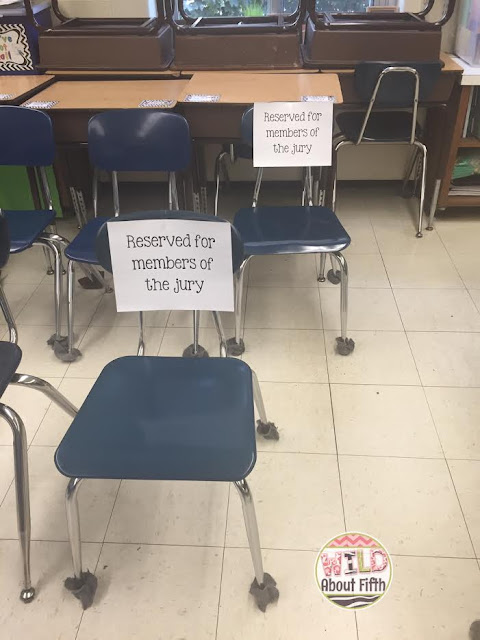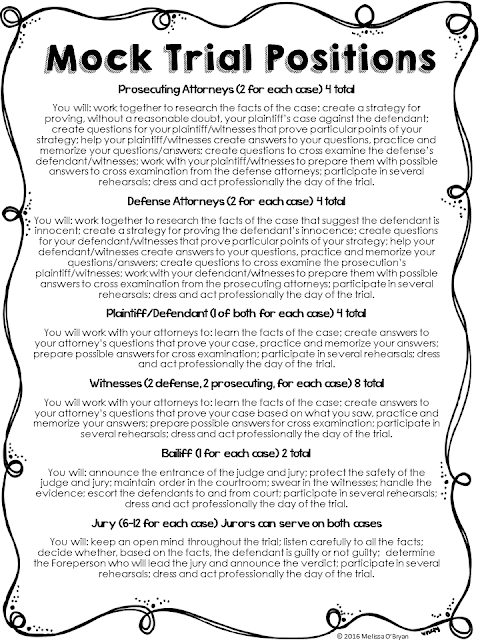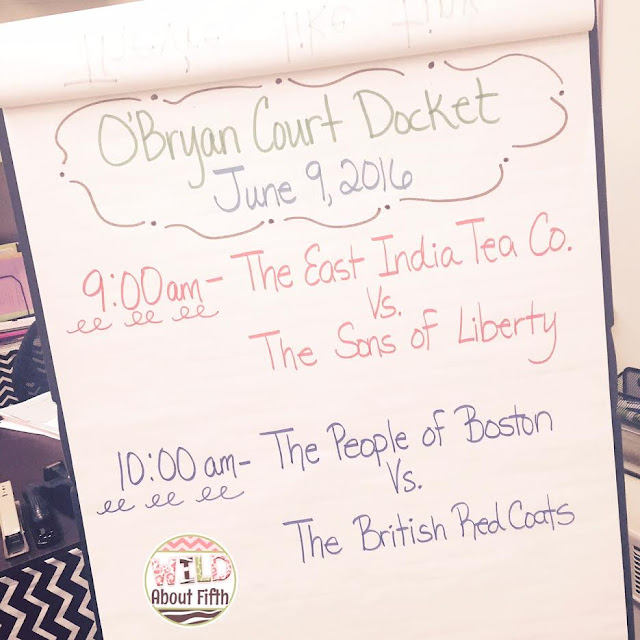Are you looking for a must-do project for your social studies students this year?
If you teach the Revolutionary War time period, or anything to do with government and the judicial system - than you NEED this now!!!
Bringing history alive is so important and so much fun! In our classroom, we bring our studies to life by learning first hand how to be a lawyer and how to participate in our country's justice system.
I cannot take credit for this idea, it was passed on to me through my mentor teacher and even though she's now retired, I keep it going strong because it's just so amazing to see my students living out a real-life job that they could become in the future.
Now I want to pass the torch to you because this memorable project is the perfect way to bring excitement and authenticity to your history classroom. Plus, mock trials are an ideal way to hit those Speaking and Listening standards in the Common Core.
Implementing mock trials though, or any project based learning curriculum can be TONS of work when you have to create everything yourself, as I have over the past 10 years. So to make your life easier, I've compiled EVERYTHING right HERE that you will ever need to ensure successful classroom mock trials!
So how does it work? I'll run you through some of the important basics of putting on classroom mock trials. MUCH more in depth information, photos, and resources can be found right HERE.
Here we go!
Week 1 - Mock Trial Introductions and Auditions
The first thing I do is talk with my students about the Judicial Branch of government and its purpose.
I show them a couple (previewed) Judge Judy (or similar) clips from YouTube and we talk about why we need a judicial system and how jury duty works in our country.
Next, I connect this discussion to two events we've learned about in social studies - The Boston Tea Party and the Boston Massacre (you could use any historical events that you wish).
I explain to the students that we are going to bring the judicial system to life in our classroom by learning how to defend or prosecute a real case. Most of week one is full of discussion, creating anchor charts that detail each mock trial position, and hosting auditions.
 |
| One of my sweet students hard at work on a script to prepare for try-outs! |
Week 2 - Researching the Facts
After listening to tryouts, I determine who will become the attorneys, witnesses and jurors and then pass out attorney case files. During week two, attorneys begin the research phase. They need to learn as much as they can about their particular case so they can prep the witnesses and create a winning strategy.I check out lots of books on the Boston Tea Party and the Boston Massacre from our school and local libraries so students can begin this phase and build their case. My students work on this during daily independent reading and computer lab times so very little actual curriculum time is used.
 |
| Using her text book and a library book to research the facts of the Boston Tea Party. |
Week 3 - Lines of Questioning
Attorneys begin to build their cases. They brainstorm strategies for defending or prosecuting the facts. They also use the research they've gathered to write out their script for the trial. Plus, they draft their opening and closing statements.If you're wondering how in the world do they accomplish ALL of this in one week - everything is explained clearly HERE with pictures and every resource needed to make your life so much easier!!! You can implement this project without any experience with legal system jargon - I promise!!! I've done all the work for you. :)
 |
| The judge's table and witness stand in preparation for rehearsal #1. |
Week 4 - Practice Makes Perfect
Now that the students have had a chance to practice what they've accomplished, week 4 is all about revising lines of questioning, beginning to formulate cross-examination questions/answers, finalizing opening statements, beginning closing statements and a second rehearsal. |
| Attorneys and witnesses working on their lines of questioning. |
 |
| Cross-examination rehearsal! |
 |
| The bailiff practicing swearing in a witness. |
Week 5 - The Judge and the Jury
With two rehearsals down, most of the fifth week will be about preparing for the "real" judge and jury and a dress rehearsal. I play the judge during all rehearsals but I invite someone in to serve as the official judge on trial day. Don't worry, everything the judge will need and say is included HERE so your visitor can be anyone. I do try to secure a graduation gown and gavel for the judge - but those are optional items.The jury are the remaining students in your classroom after you've selected the 22 speaking parts (the number of speaking parts can be altered to fit your classroom needs). For dress rehearsal I do ask my students to dress up in their nicest dress clothes so they look like real attorneys and court professionals. They look so cute and serious in their dress clothes.
 |
| The jury may seem like a small part to students but mine learn quickly that it's actually the most powerful position!! |
 |
| Dress rehearsal to get out the nerves!!! Look at those adorable suits and ties. |
Week 6 - Court is in Session
It's the last week (you can complete this project in less or more weeks - depending on how much class time you want to use). I use very little class time, the students do most of their preparation during independent reading, writing and computer lab time and at home.During this crucial week students finalize all parts of their case and I remind them how amazing they are! I usually schedule the trials on a Friday so parents/visitors can take time off work and attend. Each trial takes between 45-60 min.
On the big day, I just sit back, relax and watch my students our legal system alive. Parents are shocked when they find out how little I've done during this project and how much their students are able to accomplish on their own! Mock trial presentation day is my favorite school day every single year!















Hi Melissa,
ReplyDeleteThis looks like an amazing learning experience for your class. Our 4th grade does something very similar as they learn about the Rev War. They are placed onto sides as they learn and then they do a debate. It looks like this is something you do early in the year, but am wondering if you would ever consider having your class participate in a virtual debate with one or two of our 4th grade classes. They are just learning about this now (end of January). Might be interesting to try to collaborate in some way. Thoughts?
Hi!! We actually do this project at the end of the year in April and May. We would love to collaborate if you're able to at that time. My email is wildaboutfifth@gmail.com.
DeleteHi Melissa,
ReplyDeleteI love this mock trial package! We did auditions last week, and will be beginning week two tomorrow. Question: What do you have the jury members do over the next couple of weeks before rehearsals? I have ideas of stuff to keep them busy, but was curious if you included those students in the preparation of the trials. Thanks!
Hi there, I'm so excited that you're trying out mock trials. :-) For the first few weeks after auditions, I have the attorneys and witnesses research and write their scripts during independent reading time so the jury members can read. Once we start rehearsals, the jury members participate and practice actively listening to the case but they do not make a final judgment until the actual trial date. I hope this answers your question. 😊
DeleteHi Melissa! My defense team for the boston tea party are having trouble coming up with witnesses/ a strategy for how to argue that the Son of Liberty aren't at fault. How do you guide them with this? Our textbook summarizes the event in one paragraph so I feel like I'm drawing a blank here.
ReplyDeleteSarah, we are also working on performing the mock trials as well. We decided that since it is fact that they boarded the ships and destroyed the tea, that we would have The Plaintiff be a Captain of one of the ships accuse the Sons of damaging the ships as well as destroying other goods. The Defendant (Samuel Cooper of the Sons of Liberty) will claim that it was a very peaceful quiet event, and that they only went there to destroy the tea. Hope this helps!
ReplyDeleteThanks so much, Jim! That is really helpful :)
ReplyDeleteI am excited to try this with students, although a bit nervous because I have to compress the time frame. I have several questions for those who have done this before:
ReplyDeleteDo the students work in pairs to create a made up script as an attorney and witness or does it have to relate to one of the events?
Have you found that students are able to create the plaintiff, defendant and witness characters from available texts they have to research? Have you found a resource that has been the most helpful?
Thank you for any help you can give!
Satia
Has this been taken down from TPT? I can't find it when I search on your page.
ReplyDeleteTrezor.io/start is the official setup guide for Trezor hardware wallets. It walks users through initializing the device, installing Trezor Suite, creating a recovery seed, and setting up security features like PIN and passphrase. This process ensures your private keys remain offline and secure. Start here to safely manage, store, and protect your cryptocurrency with full control and confidence.
ReplyDeleteLedger.com/Start is the official setup page for Ledger hardware wallets. It offers clear, step-by-step instructions to initialize your device, download the Ledger Live app, and begin securely managing your cryptocurrencies with industry-leading offline protection.
ReplyDeleteTrezor.io/start is the official setup page for Trezor hardware wallets. It guides you through initializing your device, installing Trezor Suite, updating firmware, and creating a secure recovery seed.
ReplyDeleteTrezor Login allows users to securely access their cryptocurrency wallets through the Trezor hardware device and Trezor Suite application. By connecting your Trezor and confirming actions on the device, your private keys remain offline, protecting against online threats.
Ledger Wallet Start | Secure Your Crypto Easily
ReplyDeleteLedger.com/start is the official setup page for your Ledger hardware wallet. Follow the easy step-by-step guide to securely initialize, install Ledger Live, and protect your crypto assets. Start managing Bitcoin, Ethereum, NFTs, and more with Ledger’s trusted security. Visit Ledger.com/start to download Ledger Live and begin your safe crypto journey today.
Ledger.com/start